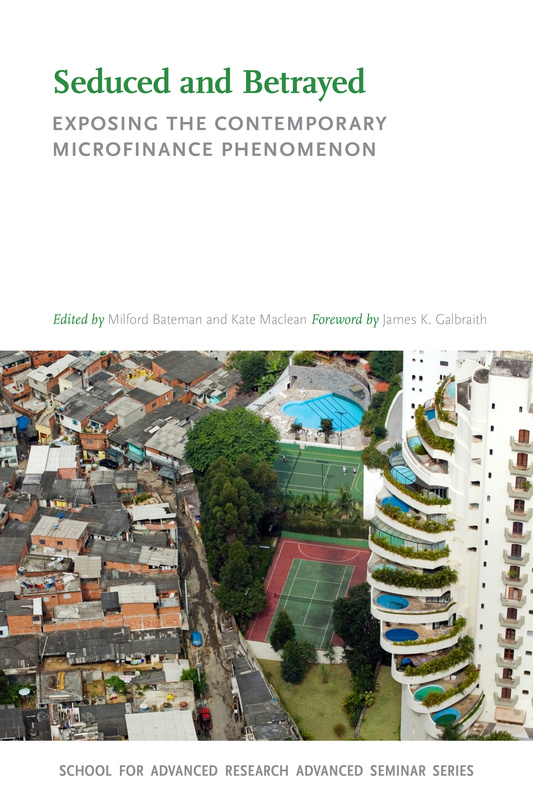
Seduced and Betrayed
Exposing the Contemporary Microfinance Phenomenon
Microfinance began as the disbursement of tiny loans to the poor, which they could use to undertake informal income-generating activities. It went on to become one of the most popular international development policies of all time and a mainstay of local development and antipoverty programs across the Global South. The contributors to this multidisciplinary volume consider the origins, evolution, and outcomes of microfinance from a variety of perspectives and contend that it has been an unsuccessful approach to development. The contributors contend that over the last twenty years, microfinance policies have exacerbated poverty and exclusion, undermined gender empowerment, underpinned a massive growth in inequality, destroyed solidarity and trust in the community, and, overall, manifestly weakened those local economies of the Global South where it reached critical mass. They use qualitative anthropological, economic, and political-economic research to unpack the ideas and values that have allowed microfinance to "seduce" the world and blind so many to its corrosive effects.
Seduced and Betrayed exhibits the brilliance of thought that heterodox economic analysis can bring to bear on important issues. The book is built on an analytical framework that encompasses the roles of context and unequal power, illuminating the sociological and psychological forces at play. For this reason alone, this book is a must-read for economists and policymakers. Its importance also lies in its success at challenging the seductive notion that microfinance promotes women's empowerment and in identifying the link between microfinance and the broader global problem of financialization of our economies.'--Stephanie Seguino, coeditor of Critical and Feminist Perspectives on Financial and Economic Crises
Milford Bateman is a visiting professor of economics in the Faculty of Economics and Tourism at Juraj Dobrila University of Pula, Croatia, and an adjunct professor in International Development Studies at Saint Mary’s University in Halifax, Canada. Kate Maclean is a senior lecturer in the Department of Geography, Environment and Development Studies at Birkbeck, University of London.
Foreword
James K. Galbraith
Introduction. Setting the Scene
Milford Bateman and Kate Maclean
Part One. Background
Chapter One. The Political Economy of Microfinance
Milford Bateman
Chapter Two. Poverty Reduction or the Financialization of Poverty?
Maren Duvendack and Philip Mader
Part Two. Seduction
Chapter Three. Pop Development and the Uses of Feminism
Meena Khandelwal and Carla Freeman
Chapter Four. Petit Bourgeois Fantasies: Microcredit, Small-Is-Beautiful Solutions, and Development's New Antipolitics
Elliott Prasse-Freeman
Chapter Five. Kiva's Staging of "Peer-to-Peer" Charitable Lending: Innovative Marketing or Egregious Deception?
Domen Bajde
Chapter Six. Muhammad Yunus's Model of Social Business: A New, More Humane Form of Capitalism or a Failed "Next Big Idea"?
Milford Bateman and Sonja Novković
Part Three. Betrayal
Chapter Seven. Bosnia's Postconflict Microfinance Experiment: A New Balkan Tragedy
Milford Bateman and Dean Sinković
Chapter Eight. From Tigers to Cats? The Rise and Crisis of Microfinance in Rural India
Marcus Taylor
Chapter Nine. The Destructive Role of Microcredit in Post-apartheid South Africa
Milford Bateman and Khadija Sharife
Chapter Ten. Public Goods Provision Aided by Microfinance: Thanks to Groupthink and Ideological Blinkers, It's a Success
Philip Mader
Chapter Eleven. The "Scandal" of Grameen: The Nobel Prize, the Bank, and the State in Bangladesh
Lamia Karim
Chapter Twelve. Agricultural Microfinance and Risk Saturation
Charlotte Heales
Part Four. Alternatives
Chapter Thirteen. Banking on the Difference: Credit Unions as Superior Local Financial Institutions for the Poor
Jessica Gordon Nembhard
Chapter Fourteen. Microfinance and the "Woman" Question
Kate Maclean
Chapter Fifteen. Moral and Other Economies: Nijera Kori and Its Alternatives to Microcredit
Kasia Paprocki
Chapter Sixteen: The "Solidarity Economy" Model and Local Finance: Lessons from New Left Experiments in Latin America?
Milford Bateman and Kate Maclean
Conclusion. It's the Politics, Stupid
Milford Bateman and Kate Maclean
References
Contributors
Index




